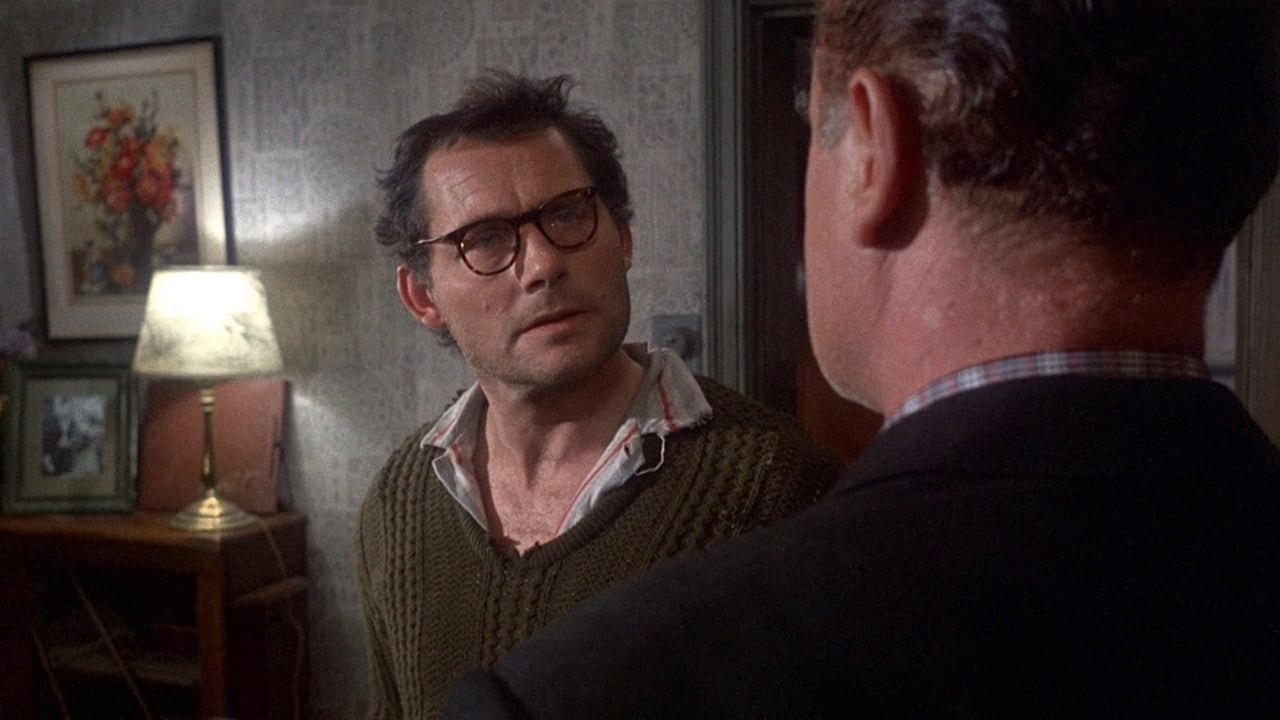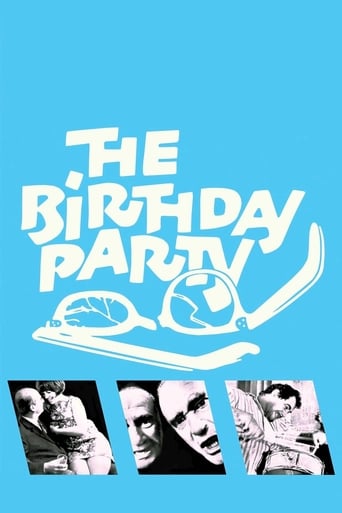

I think that Roger Ebert pinned this work down when he said that adapting the Pinter play would inherently cause some problems - what one can buy as a little more fantastical and hermetically sealed on a stage, where one can be just stuck with these two people on the 'job' with their assignment as Mr. Stanley Webber (Robert Shaw) is a little harder to buy in a film because the reality is different (at least in this case. While I would recommend the film to people, especially for those who want to seek out Friedkin's oeuvre, and it has some terrific performances, it is an exceedingly strange and odd sit.The film is about... well, what is it really? I suppose it's about what happens to a man when he cracks under the weight of pressure and has a nervous breakdown, but that's the sort of main-ultimate point, if there is one. I felt like Pinter was challenging me and the audience, though to what end I am sure I don't know. Of course there is a great deal of suspense - what Shaw knows that the owners of the house don't about these two stranger-boarders (Patrick Magee, who you may recall as the Writer from Clockwork Orange, and Sydney Taffler who is really razor-sharp and wonderfully sadistic as Nat Goldberg) - amid this 'birthday party' which is now really on his birthday.Of course this is what is called 'theater of the absurd'. And to this point there are a few funny moments, but I wouldn't necessarily call it a comedy, at least in Friedkin's hands. Perhaps it's because of the edge of Robert Shaw, who is probably the main reason to watch the film is for his startling performance that keeps an emotional through-line. When he first starts off in the movie he's mad at Dandy Nichols for... something or other (the tea, the corn flakes, the milk, for not, uh, talking to him in a particular way). One almost wonders if he's about to strike her, it's that sort of intense screen persona. But there's a lot more to his character and Shaw conveys this in this big early scene (he's also, I think, an ex-concert pianist or something).You have to be set in the right frame of mind for this movie, and it definitely won't spoon-feed you easy dramatic answers to questions that are posed. By the end I was still not sure who Goldberg and McCann represented (my first thought was they were in some criminal organization - the "job" aspect made me think of a heist, and perhaps that's not that far from the truth by the very end, in a sense). Maybe it's a metaphor for how easily people can crack up, how manipulation and torture are so insidious, especially when pressed hard enough, and meanwhile the mostly happy old Mrs Bowles has her own dimensions too and works as a counterpoint for everyone else (she, along with her husband, has nothing to hide).There's also some dazzling and bizarre camera and lighting choices, though these mostly come in the last couple of reels as the birthday party 'amps up' so to speak, with a camera at one point latched on to a character's head for dizzying perspective and when the lights go out at one point it's... I can't even. The point is, The Birthday Party is a good little find that is Friedkin in love with a piece of material that is bold, difficult and gives himself some chance to take what he learned directing television (I'm not sure if he did live theater but it wouldn't surprise me) into cinema and make it alive and thrashing. Whether it all makes sense is another story.
... View MoreI thought the first ten minutes or so were great as the film has a really nice gritty, dark, grimy look to it. The storyline and pace started off OK and I was interested to see how it would develop. However, after about twenty minutes or so, the non sequiturs and random unexplainable dialogue (that seemed to imply there was something more to everything that was being said but never actually went anywhere) started to become really boring.Once those two fellas entered the scene it started to drag even more. Just a bunch of rambling nonsense. I couldn't bear it any longer and flicked through the last half hour.
... View MoreHaving seen many of Pinter's efforts on screen (The Servant, The Pumpkin Eater, Accident, The Last Tycoon, Sleuth etc) over many years, it was a great pleasure to finally see this early work which entertains and tantalizes in equal measures. From a Pinter-written play first produced in 1958, one of my favorite directors, William Friedkin, briskly directed a handful of brilliant actors in a story which has puzzled viewers and critics for over forty years.Recognizing that every viewer's experience of reality is different, let me describe what I saw and suggest a possible theme: A typical, sea-side boarding house owned by a less-than-middle class, middle-aged couple (Dandy Nichols, Moultrie Kelsall) eking out their daily drudge; a lone, youngish boarder and apparent musician (Robert Shaw) who looks and acts like a rude, lazy bum; and a mysterious pair of men (Patrick Magee, Sydney Tafler) who arrive at the abode to visit the young border and celebrate his birthday.The action - talk-fest is a better word - takes place in the front dining-sitting room over the course of the day, the evening and the next morning. Initially, Stanley (Robert Shaw) is verbally battered and intimidated by Nat (Sydney Tafler) and Shamus (Patrick Magee) with conversation which oscillates from the banal to the insidious; at one point, Stanley even punches Nat. Meanwhile, Meg (Dandy Nichols) goes out food shopping; her husband, Pete (Kelsall) is out at work as beach deck-chair supervisor. Shamus, significantly, has the unsettling habit of tearing a page of newspaper into precisely ordered strips; and then arranging them as a 'page' again. Over and over again....As evening arrives, there is a birthday 'party' of sorts which gradually degenerates into a drunken altercation between the three men, leaving Stanley mentally bowed and beaten - but not physically so. The party includes the infantile game of Blind Man's Bluff, a long toast to Stanley's birthday, binge drinking, and ends with Stanley smashing bottles, glasses and finally screaming for help in the darkness. Fade to black.The next morning, with Meg and Pete out of the house, a fresh-looking Nat, looking every bit The Organization Man - including sleek, smart, black briefcase - discusses Stanley's condition with Shamus while he, once again, proceeds to tear newspaper into orderly shreds. It is during that exchange where we learn the nature of Stanley's problem and why they need to take him away. At which point, Stanley now enters as the New Man after his Birth Day: showered, shaved, and suited up appropriately - looking and acting like a condemned man. As the three prepare to depart, Pete arrives, concerned for Stanley, but is told by Nat to leave it to them to handle it all. As the front door closes, Pete calls out after them: "Stan - don't let them tell you what to do!"Pete goes back to his newspaper reading. Meg returns and, when assured by Pete that Stanley is fine, they simply continue with their new day - thus cementing their implicit acceptance of Stanley's fate. Fade to black.In my view (no pun intended), this play is a metaphor, showing how modern capitalism squeezes the young - including the artistic Stanleys of the world - into a sleazily-suited life of mindless, office sludge. Hence, it could be compared to, say, Patterns (1956) which is all about raw corporate ethics. Or, better still, The Man in the Gray Flannel Suit (1956) - a somewhat less strident critique of modern man's self-made commercial trap which ensnares most into pointless paper-pushing - and the self-destructive consequences thereof. Is there more than just a touch of Pinter in Stanley's dilemma which Pinter wrote when only 28? Perhaps.The acting, direction and cinematography are simply brilliant; as is the dialog, which must be followed closely to enjoy to the fullest. Sure, it's a claustrophobic setting for some viewers, being in one room for most of the time. All the better to concentrate on the characters, surely? Are we not, ourselves, always in one room much of the time, anyway?Highly recommended for all. Nine out of ten.
... View MoreHarold Pinter's work is infuriating at best, but this film version comes close to making some sense of 'The Birthday Party'. Dandy Nichols runs a boarding house in which oddball lodger Stanley lives (very well played by Robert Shaw) and when two unusual menacing visitors arrive (Patrick Magee and Sidney Tafler) events start to get progressively weirder. The play is dark, claustrophobic, and extremely clever, and the film plays on this - I particularly liked the sequence with the torchlight which had heaps of atmosphere. Not seen much, this version is now commercially available again and hopefully will be eventually viewed in the same light as other Pinter movies such as 'Accident'. It deserves better than it has had so far.
... View More